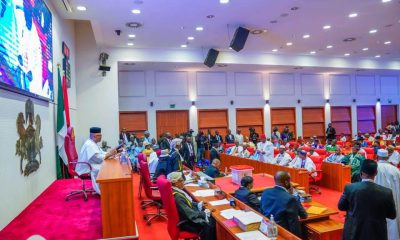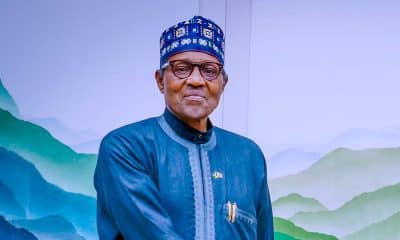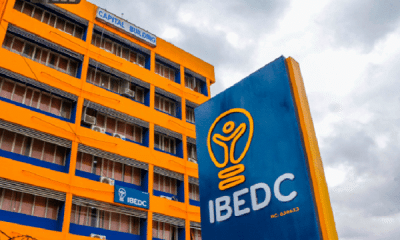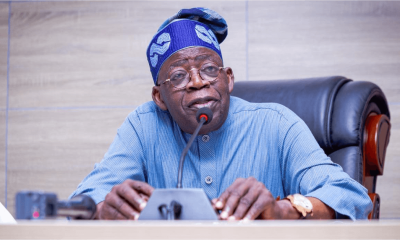Nigeria News
New Minimum Wage Bill Passes Second Reading At National Assembly
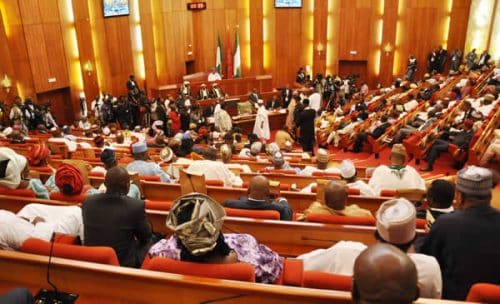
Senate Says The bill Sent To It Has N27,000 For All Workers
The National Assembly has already commenced legislative proceedings on the new minimum wage bill transmitted to it by President Muhammadu Buhari.
New minimum wage N27,000
Current dollar rate N360
N27,000÷$360=$75
$75 is monthly pay check.Furthermore, $75÷30days not hourly
That brings it to $2.50 per day.Good news :We no longer live on one dollar per… https://t.co/GS30HY5Dbj
— War Against I & C (@WarAgainstIC) January 24, 2019
The new minimum wage bill passed the first and second readings at the Senate on Thursday just hours after President Buhari transmitted the draft legislation to the lawmakers.
The president’s letter, read to the lawmakers by the deputy Senate president, Ike Ekweremadu, urged the amendment of the National Minimum Wage Amendment Act 2011 to raise the minimum wage from N18,000 to N27,000.
Naija News recall a tripartite committee set up by the government recommended N30,000, but the council of state on Tuesday accepted that figure for federal staff and recommended N27,000 for state and private sector workers.
The Nigeria Labour Congress has rejected the N27,000. It insists on N30,000 for all workers.
Meanwhile, the Senate said the bill sent to it made N27,000 minimum to all workers, with no variation between federal and state workers.
“The tripartite committee comprises representatives of the federal government, governors’ forum, organized private sector and organized federations of trade unions in Nigeria. The Federal Executive Council, National Executive Council, National Council of States have all noted and approved this recommended amendment,” the president explained in the letter.
Other highlights of the amendment include exemptions for establishments employing less than 25 persons, five years review period of the Act in consonance with the constitutional review period for pensions, and alterations in the number of fines payable by defaulters on persecution.
Shortly after Mr. Ekweremadu read out the letter, the Senate Leader, Ahmed Lawan, raised a point of order asking the lawmakers to suspend Order 79 (1) of the Senate Standing Order and take the first and second reading of the bill.
Order 79 of the Senate Standing Order stipulates that all bills should go through first, second and third readings before passage.Mr. Lawan’s point of order was adopted and the lawmakers deliberated on the bill.
While some lawmakers commended the National Council of States for the amendments, the majority of the lawmakers who contributed to the debate expressed disappointment at the federal government as they urged the executive to increase the minimum wage to N30,000.
In his remark, Mr. Ekweremadu congratulated the Nigerian Labour Congress and all those that struggled for the success of the bill. He also thanked his colleagues for the speedy consideration.
“This is possibly the first time in the 8th Senate that we have had cause to read executive communication, suspend our rules to take the first and second reading and be referring a bill to the committee all in one day. It shows how committed we are to a course of Nigerian workers. We are ever prepared to do more,” he said.
“Just for emphasis, the minimum wage proposed by the government for us is 27,000. There was a news report of N27,000 for the states and N30,000 for the federal government. But what we have before us is a single National Minimum Wage of N27,000, no discrimination between the federal workers and the state workers, that point must be made clear,” he said.
“The other issue of concern to me is the exemption of organizations employing less than 25 people. So, if that scales through, and I hope it does not, then it means that many of our workers will be outside the minimum wage bracket, that includes domestic servants. In many other countries, minimum wage applies across board whether you are employing one person or one million people.
“Another issue is the ability of states to pay. That means that they may have to make sacrifices in some areas including cutting the overheads and once you have to step up the internally generated revenues and also make more efforts in collecting collectible taxes, not imposing more taxes. There must be a conscious effort to bridge the gap between the rich and the poor,” he added.
The bill was read for the second time and referred to an ad hoc committee for further legislative action.
The committee comprises of Olusola Adeyeye as chairman, Abu Ibrahim (to represent the committee on labour), Shehu Sani (to represent the North West), Sam Egwu (South East), Suleiman Adokwe (North Central), Francis Alimekhena (South-South), Solomon Adeola (South West) and Binta Masi Garba (North East).



